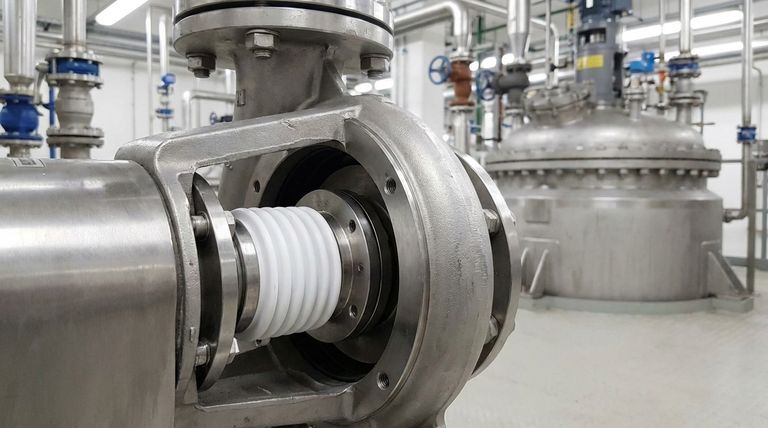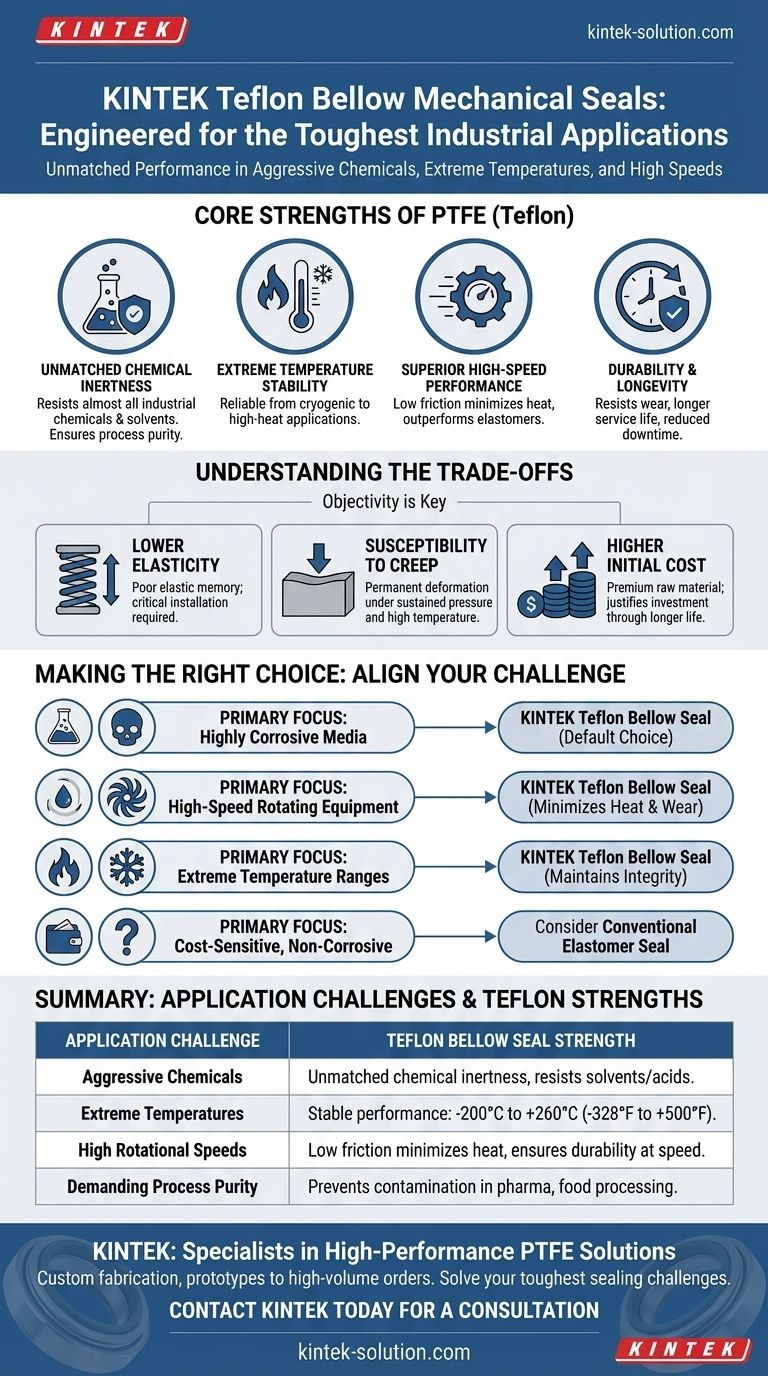In the world of industrial sealing, Teflon Bellow Mechanical Seals are specified for the most demanding applications where other materials would quickly fail. They are the premier solution for machinery handling aggressive chemicals, operating at extreme temperatures, and running at high rotational speeds, making them essential in pumps, mixers, and agitators across the chemical, pharmaceutical, and food processing industries.
The core value of a Teflon Bellow Mechanical Seal is not its ability to handle a single harsh condition, but its unique capacity to withstand a combination of challenges simultaneously. Its effectiveness is a direct result of the fundamental properties of its core material, Polytetrafluoroethylene (PTFE), namely its chemical inertness, thermal stability, and low-friction nature.

The Core Strengths of Teflon (PTFE) Bellows
To understand where these seals excel, you must first understand the material they are made from. The term "Teflon" is a brand name for PTFE, a fluoropolymer with a unique set of engineering properties.
Unmatched Chemical Inertness
A Teflon bellow is virtually immune to chemical attack. It is inert to almost all industrial chemicals and solvents.
This property is critical for preventing seal degradation, ensuring process purity, and providing reliable leak protection in corrosive environments where elastomers like Nitrile or Viton would be destroyed.
Extreme Temperature Stability
PTFE maintains its integrity across an exceptionally wide thermal range, typically from -200°C to +260°C (-328°F to +500°F).
This allows Teflon bellow seals to be used in everything from cryogenic applications to high-temperature chemical reactors without becoming brittle or degrading.
Superior High-Speed Performance
PTFE has an extremely low coefficient of friction, which is why it is also used for non-stick coatings.
In a mechanical seal, this low friction minimizes heat generation at the seal faces, even at high rotational speeds. This makes PTFE the top material choice for high-speed applications, outperforming common elastomers.
Durability and Longevity
The combination of chemical, thermal, and frictional resistance means Teflon seals are exceptionally durable.
They resist wear and degradation from harsh operating conditions, resulting in longer service life, reduced downtime, and greater reliability in critical machinery.
Understanding the Trade-offs and Limitations
While powerful, no engineering solution is without its trade-offs. Objectivity requires acknowledging the specific limitations of PTFE.
Lower Elasticity
PTFE is a polymer, but it is not a true elastomer like rubber. It has poor "elastic memory," meaning it does not spring back to its original shape as effectively after being compressed.
This makes proper installation critical. It also means Teflon seals may be less forgiving of equipment with high vibration or significant shaft runout compared to more flexible seals.
Susceptibility to Creep
Under a combination of sustained pressure and high temperature, PTFE can be susceptible to "creep" or "cold flow." This is a slow, permanent deformation of the material.
Engineers account for this in the design of the seal and its hardware, but it is a fundamental material property to be aware of in high-pressure, static applications.
Higher Initial Cost
Teflon bellow seals are a premium product. Their manufacturing process and the cost of the raw material make them more expensive upfront than standard elastomer seals.
However, this initial investment is often justified by significantly longer life and reduced maintenance costs in the aggressive applications they are designed for.
Making the Right Choice for Your Application
To select the correct seal, you must align your primary operational challenge with the seal's core strengths.
- If your primary focus is handling highly corrosive media: The chemical inertness of a Teflon bellow seal makes it the default choice for protecting equipment and preventing process contamination.
- If your primary focus is high-speed rotating equipment: PTFE's low-friction properties minimize heat generation and wear, significantly outperforming traditional elastomers in these conditions.
- If your primary focus is extreme temperature ranges: A Teflon bellow is one of the few sealing options that can maintain its integrity and performance from cryogenic lows to high-heat process fluids.
- If your system is cost-sensitive with non-corrosive media: A more conventional and economical elastomer bellow seal may be the more appropriate solution.
By understanding these fundamental properties and trade-offs, you can specify a Teflon bellow seal with confidence, ensuring reliability where it matters most.
Summary Table:
| Application Challenge | Teflon Bellow Seal Strength |
|---|---|
| Aggressive Chemicals | Unmatched chemical inertness, resists almost all industrial solvents and acids. |
| Extreme Temperatures | Stable performance from -200°C to +260°C (-328°F to +500°F). |
| High Rotational Speeds | Low friction minimizes heat generation, ensuring durability at high speeds. |
| Demanding Process Purity | Prevents contamination in sensitive processes like pharmaceuticals and food. |
Need a sealing solution that won't fail under pressure?
KINTEK specializes in the precision manufacturing of high-performance PTFE components, including custom Teflon bellow mechanical seals. Whether you're in the semiconductor, medical, laboratory, or industrial sector, our seals are engineered to withstand the harshest combinations of chemicals, temperatures, and speeds.
We offer custom fabrication from prototypes to high-volume orders, ensuring you get a seal perfectly matched to your application's demands. Don't let seal failure cause costly downtime—let our expertise in PTFE ensure your equipment's reliability and longevity.
Contact KINTEK today for a consultation and see how our PTFE solutions can solve your toughest sealing challenges.
Visual Guide

Related Products
- Custom PTFE Parts Manufacturer for Teflon Containers and Components
- Custom PTFE Parts Manufacturer for Teflon Parts and PTFE Tweezers
- Custom PTFE Sealing Tapes for Industrial and High Tech Applications
- Customizable PTFE Crucibles for Laboratory and Industrial Applications
- Custom PTFE Sleeves and Hollow Rods for Advanced Applications
People Also Ask
- What are the unique properties of PTFE? Unlock Unmatched Performance in Demanding Applications
- What is the working temperature range of PTFE? Master Extreme Heat and Cryogenic Applications
- What are the best practices for achieving tight tolerances in Teflon (PTFE) machining? Master Precision for Demanding Applications
- What are some common applications of machined PTFE? Leverage its Unique Properties for Demanding Applications
- What are the primary applications of PTFE fasteners and custom parts? Critical Solutions for Extreme Environments



















